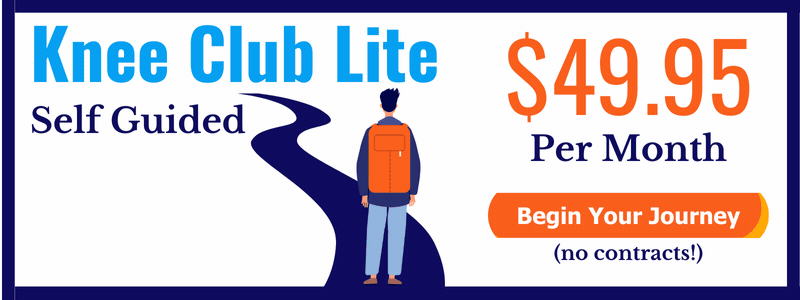Most people walk, run, and move around with no knee pain because the cartilage in their knees acts as the cushion for the joint.
Thank goodness for that cartilage too, because without it, even bending the knee would be extremely painful.
What begins to happen with Arthritis, Osteoarthritis or Degenerative Joints is this: the cartilage begins to slowly wear away until the knee is left without any protective barrier between the bones.
Arthritis is certainly not a rare condition. The CDC reported “nearly 1 in 2 people may develop symptomatic knee [Osteoarthritis] by age 85.” A lot of the time, if nothing is done to stop the arthritis from worsening, you will be left with a bone on bone condition and your doctor will recommend knee replacement surgery.
There is, however, something you can do to stop the deterioration in your knee long before you reach that point.
Across the board, doctors will diagnose the early stages of this condition as “dehydrated knee” or “degenerative joint pain”.
Dehydrated knee occurs over time. And the pain becomes more and more chronic as the condition worsens. The pain is created by the tension your body creates to protect itself from pain. It’s ironic to be sure.
The tension pattern squeezes on the nerve endings in your knee and literally squeezes the fluid out of the joint. This fluid is what lubricates the joint and without it, the joint begins to wear.
This situation marks the beginning of an uphill battle. Water will lubricate the knee, if you drink enough of it. However, in the case of arthritis, once the joint tightens up, the water you drink won’t be able to get back into the knee to lubricate it again.
If you are able to let the nerves release the tension they are holding, the joint will slowly adjust and eventually start allowing the water you drink to get back into the joint.
To get this treatment process working for you, the first step is relaxing the tension pattern and putting your knee in what I call the “Comfort Zone”.
This arthritis treatment allows your knee to be comfortable using a daily practice of Passive Stretching that is demonstrated in my e-book and online video program, The Comfort Zone.
When you allow the nerves to calm down and stop sending messages to your brain that you are in pain… the nerves relax, the joint opens up and fluid can actually creep back into the knee joint. The cartilage begins to rehydrate and your chronic knee pain is over.
To get information about the Comfort Zone ebook and online video program click here → The Comfort Zone.


bill,im having an arthroscopy next week.i have a complex tear of my medial meniscus and also some cartilage degeneration.my orthpaedic consultant said he will see more with the arthroscopy than on the scan i had done and will deciede what to do while doing the arthroscopy.how soon afterwards can i start doing some simple stretches?
Tommy,
After undergoing knee arthroscopy, it is important to begin exercising your knee immediately to restore strength and full range of motion. Initial exercises should be non-weight bearing in nature, and should focus on gentle strengthening of the muscles surrounding the knee as well as increasing joint range of motion. I will reach out to you via email to recommend some great programs to help you out. You may also contact us at 502 638 2567 or customerservice@thekneepainguru.com for additional questions or concerns.
Kind regards,
Mimi|Customer Support
I had a partial meniscectomy of both medial & lateral last year that I should not have had – should have waited to see how much my would heal on its own. Had some medial and lateral removed and it is in the lateral compartment that I am having pain now. My sports med doctor says some of the pain I have below the knee is probably bone on bone caused by changes due to surgery. He recommended against surgery & I went ahead because the surgeon said I would be “good as new.” Hah! Only had medial pain but… Read more »
Hi Mary,
Thanks for your Comment. Yes, I believe my program can work for you. Lets setup a time to talk and figure out a strategy for your knee.
Here’s a link to a short application so we can get you on my schedule:
https://thekneepainguru.com/lp/knee-recovery-program/free-introductory-session/questionnaire/
Looking forward to speaking with you.
Regards
Adam of behalf of Bill
I just have to disagree with this. I live in Az. I drink tons of water. TONS! I never leave home without my cup. Ever! It’s 32 oz. and I fill it multiple times per day. I drink water all day and night. I just can’t agree with this at all.
Hi Terri, He doesn’t say its because you don’t drink enough water, he says its because the water you drink doesn’t get INTO the knee. Funny, I just had a doctor tell me something similar about a pinched nerve in my back. Not about water but about the need to relax the tension pattern to allow the nerve to release. Read the article again more carefully. I often take offense at something and miss the information I need. Hope this doesn’t offend you, only trying to be helpful. Be well, good luck.